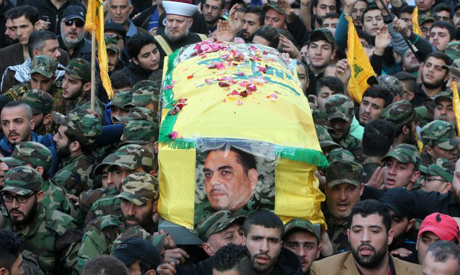
Members of Lebanon's militant Shiite Muslim movement Hezbollah carry the coffin of Lebanese militant Samir Kantar (portrait), who was killed in a suspected Israeli air-raid on his home in the Jaramana district on the outskirts of the Syrian capital Damascus, during his funeral procession in a southern suburb of the Lebanese capital Beirut on December 21, 2015. (AFP PHOTO)
Lebanon's Shia movement Hezbollah on Monday gave a "martyr's" funeral in Beirut for controversial militant Samir Kantar who was killed in a suspected Israeli air strike in Damascus.
Militants manned checkpoints as Kantar's coffin, draped in the movement's yellow-and-green flag, was carried to its burial place in the capital's Ghobeiri area, a bastion of Hezbollah support.
"The Israelis still haven't learned that with all these assassination attempts on leaders they are committing a huge mistake," senior Hezbollah official Hisham Safiedine said.
A thick crowd chanted "Death to Israel! Death to America!" and waved the Palestinian, Lebanese and Hezbollah flags, as the coffin was carried to a mausoleum reserved for "martyrs".
A day after rocket and artillery fire was traded over the border with Israel, Hezbollah chief Hassan Nasrallah was later Monday to give an address on the killing of Kantar, who commanded operations for the group in Syria's occupied Golan.
Israel has welcomed news of Kantar's death without claiming responsibility for the air strike that killed him, allegedly with four missiles fired from Lake Tiberias in northern Israel.
Shortly after Kantar's release from an Israeli prison in 2008, however, a top Israeli security official had warned he was a "target".
Hezbollah played a key role in Kantar's release after he had spent 30 years in Israeli jails, becoming known as the longest-serving Arab prisoner.
Kantar was still a teenager when he and three other members of the Palestine Liberation Front infiltrated the Israeli village of Nahariya by sea from Lebanon in 1979.
The militants shot dead Danny Haran, 28, and battered his four-year-old daughter Einat's skull with rifle butts.
Kantar was sentenced to five life terms plus 47 years for murdering the father and daughter and an Israeli policeman.
Shortly after his release, he joined Hezbollah.
The Syrian Observatory for Human Rights said he became "head of the Syrian resistance for the liberation of the Golan," a group launched two years ago by Hezbollah in the region, most of which Israel seized in the 1967 Middle East war.
"In his seven years of freedom, Samir was involved in the resistance (against Israel) in Lebanon and when the first signs of resistance appeared on the occupied Golan front, he was one of the first to join up and Israel tried six times to kill him in Lebanon and Syria," his brother Bassam said in an article published in Lebanese daily Al-Akhbar.
"When Nasrallah announced we would soon see a Syrian resistance just as efficient as the Shia resistance in southern Lebanon, Kantar was part of the equation," according to Hezbollah expert and professor of sociology Waddah Sharara.
Originally from the Druze mountains southeast of Beirut, Kantar was among Lebanese youths who fought alongside Palestinian militants in the country's civil war in the 1970s.
Druze leader Walid Jumblatt, whose father Kamal was a figurehead for Lebanese leftist movements before his assassination in 1977, paid tribute to Kantar.
"Despite the differences in our political positions and on the Syria crisis, we condemn the death of the militant Samir... who dedicated his life to the struggle against Israeli occupation," he said.
Short link: